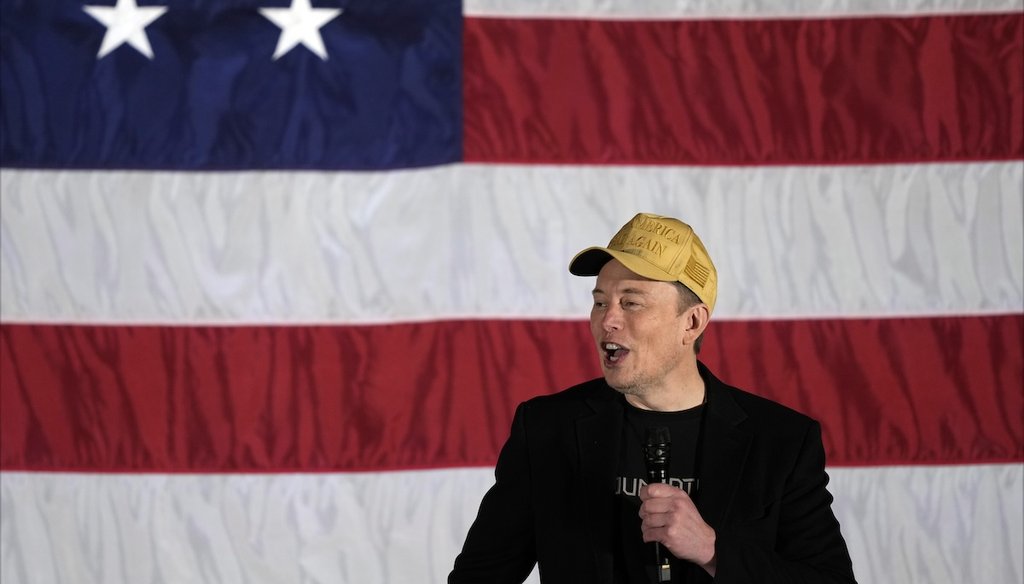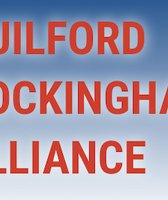Get PolitiFact in your inbox.

Elon Musk speaks at a campaign town hall on behalf of former President Donald Trump in Folsom, Pa., on Oct. 17, 2024. (AP)
Social media exploded this week with the news that billionaire entrepreneur Elon Musk will hold a $1 million daily lottery for registered voters in battleground states who sign his petition supporting free speech and the Second Amendment.
Musk fans were elated. Critics said the giveaway could be illegal.
To qualify for the lottery, petition signers must be registered to vote in Arizona, Georgia, Michigan, Nevada, North Carolina, Pennsylvania or Wisconsin, the seven states widely acknowledged as battlegrounds in the 2024 presidential election. Musk’s America political action committee said it had already given out the first two $1 million checks, to Republican voters who had already cast their ballots by mail, media outlets reported.
"I think it's something that law enforcement could take a look at," Pennsylvania’s Democratic governor, Josh Shapiro, said Oct. 20 on NBC’s "Meet the Press."
Some election law experts, including Richard Hasen of University of California, Los Angeles, said Musk’s gambit could run afoul of 52 U.S.C. 10307(c), a federal law that says whoever "pays or offers to pay or accepts payment either for registration to vote or for voting shall be fined not more than $10,000 or imprisoned not more than five years, or both."
The Campaign Legal Center, a nonpartisan group that advocates for voting rights and campaign finance oversight, released a statement, saying, "It is illegal to buy votes, it is illegal to buy voter registration, and the Department of Justice has the power to enforce these important laws through civil or criminal action."
Although the Justice Department has the power to bring a criminal case, legal experts told PolitiFact it’s highly unlikely Musk would be prosecuted, and certainly not before Election Day 2024.
The law’s enforcement could fall either to the Federal Election Commission or the Justice Department.
The FEC "can review whether there is a civil or criminal violation," said Jerry H. Goldfeder, senior counsel with the law firm Cozen O'Connor. "Such a matter usually takes months and months, starting with an internal decision to open the matter, and then presenting Musk with an opportunity to respond."
And that’s a best-case scenario for timing. In reality, FEC enforcement has been hobbled for years because its members are split between political parties, making it hard to reach the majority required to pursue enforcement.
The Justice Department could act before waiting for an FEC referral, but this poses prosecution challenges, too, experts said. Deciding whether to launch a Justice Department prosecution is a slow process, Goldfeder said.
And Musk’s case would be unusual, without a track record of successful, similar prosecutions or a playbook for how to mount them.
History suggests that a case such as this would have a low likelihood of prosecution, said Stanley Brand, a longtime Washington, D.C., attorney in political cases who currently serves as distinguished fellow at Penn State Law.
Most of the relevant statutes are misdemeanors with light sentences and fines, Brand said. "The significant resources needed to bring such cases and their minimal deterrent effect has often dissuaded the (Justice) Department from using them."
If the Justice Department did decide to prosecute, Brand said, it would more likely build a felony case using the law on mail, wire and "honest services fraud." However, the U.S. Supreme Court has in recent years repeatedly rejected the government’s use of these statutes in public corruption cases, raising the bar for a decision to prosecute.
In several cases involving political figures, including former Virginia Gov. Bob McDonnell, a Republican, the Supreme Court justices have characterized the activity in question "as conduct that is corrupt, tawdry and deceitful but outside the reach of criminal law," Brand said.
Citing the pushback Special Counsel Jack Smith has faced in attempting to quickly bring cases to trial against former President Donald Trump, Brand said he doubts a prosecution of Musk "would pay a high percentage return to engage."
Finally, prosecuting Musk would only be possible if Kamala Harris wins the presidential election and the attorney general she appoints decides to pursue it. If Trump wins, he almost certainly would appoint someone who wouldn’t bring the case against one of his closest allies.
Our Sources
The Washington Post, "Musk promises a daily $1 million lottery in questionable pro-Trump effort," Oct. 20, 2024
Richard L. Hasen, "Elon Musk Veers Into Clearly Illegal Vote Buying, Offering $1 Million Per Day Lottery Prize Only to Registered Voters," Oct. 19, 2024
Campaign Legal Center, statement, Oct. 21, 2024
Bridget Vuona , "Remember Me, "Part C"? Honest Services Fraud Schemes Involving Bribery Under "Part C" of the Federal Bribery Statute Post-McDonnell" (American Criminal Law Review), 2018
Politico, "The first winners of Elon Musk’s $1M giveaway are Pa. Republicans who already voted," Oct. 21, 2024
Email interview with Stanley Brand, distinguished fellow in law and government at Penn State University, Oct. 21, 2024
Email interview with Jerry H. Goldfeder, senior counsel with the law firm Cozen O'Connor, Oct. 21, 2024
































